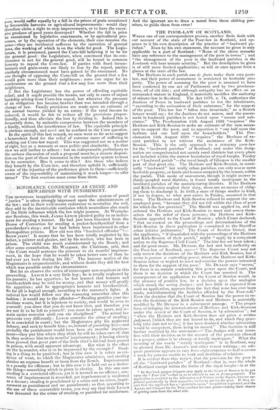' , IGNORANCE CONDEMNED AS CRIME AND REWARDED WITH PUNISHMENT.
THE monstrous inapplicability of our retributive system of penal " justice " is often strongly impressed upon the administrators of the law ; and in their well-meant endeavour to neutralize the evil, they add to the inextricable confusion which neutralizes also much of the little influence which the law might possess. At Westmin- ster Sessions, this week, JAMES LYNCH pleaded guilty to an indict- ment for stealing a bonnet. He had just been liberated from the House of Correction for stealing a pocket-handkerchief from a pawnbroker's shop ; and he had before been imprisoned in other Metropolitan prisons. How old was this "hardened offender"?— Seven years! It seems that he has been totally neglected by his father, a painter and glazier, and by his mother, who has been in prison. The child was much commiserated by the Bench ; and after some consultation, Mr. WALESBY, the Chairman, said, that "the Court would sentence the prisoner to six months' imprison- ment, in the hope that he would be taken better care of than he had ever yet been during his life." The humane motive of the Magistrates is unquestionable, and without doubt they did the best which was possible under the circumstances. But let us observe the series of extravagant non-sequiturs in this proceeding. LYNCH is a very little boy ; he is totally neglected by his parents; he has appetites ; he has learned that bonnets and handkerchiefs may be sold for money, and that money will gratify his appetites ; and he appropriates bonnets and handkerchiefs. So far all is logical enough, according to the reasoner's lights. A rational law would follow out the reasoning somewhat after this fashion : it would say to the offender—" Stealing gratifies your im- mediate wants, but it is injurious to society, and would be even to yourself: you show that you do not know that, and therefore you are not fit to be left to yourself: you must be taken apart, and re- main under restraint until you are disciplined." The actual law proceeds very differently : LYNCH commits the crime of stealing ; he is convicted in court ; but the Magistrates pity his neglected infancy, and seek to benefit him ; so, instead of punishing him—and probably the punishment would have been six months' imprison- ment—they put him where they think he will be taken care of, that is, they sentence him to six mouths' imprisonment ; it havibg already been proved that great part of the little thief's life had been passed in prison, with small apparent advantage. But what is the effect on the bystander, who is to be impressed by the example ? Steal- ing is a thing to be punished ; but in this case it is taken as evi- dence of want, to which the Magistrates administer, and stealing obtains an express benefit or boon from the Bench. Imprisonment is a penalty for offences ; but in this case it is held out as a desira- ble thing—something which is given in charity. In this one case stealing is a convicted offence, yet it is treated as no offence; sen- tence of imprisonment is recorded, yet imprisonment is conferred as a favour; stealing is proclaimed as a crime and no crime, impri- sonment as punishment and no punishment ; so that, according to the use of these convertible terms, you may say that little LYNCH was favoured for the crime of stealing, or punished for misfortune. And the ignorant are to draw a moral from these shifting pre- mises, to guide them from error !






















 Previous page
Previous page